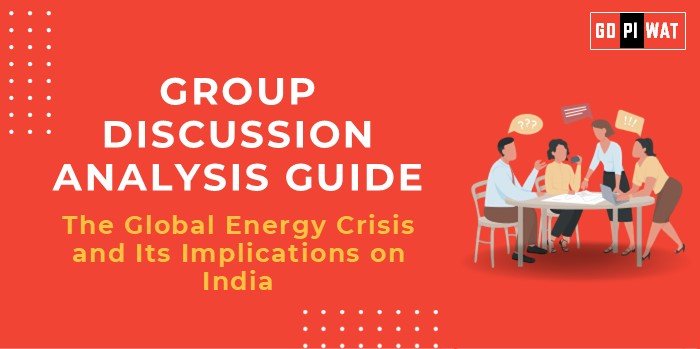📋 Group Discussion Analysis Guide: The Global Energy Crisis and Its Implications on India
🌐 Introduction to the Global Energy Crisis
The global energy crisis has impacted economies worldwide, revealing the vulnerabilities of energy-dependent systems and driving a critical need for sustainable solutions. India, one of the world’s largest energy consumers, faces significant repercussions as the crisis highlights the country’s dependency on fossil fuels, rising energy demand, and the environmental costs of energy-intensive industrialization.
📊 Quick Facts and Key Statistics
💵 Subsidy Expenditures: Reached a 9-year high in 2023, with fossil fuels accounting for approximately 40% of the subsidies.
⚡ Coal’s Role in Electricity Generation: Coal remains the primary source of electricity in India, covering nearly 70% of the country’s needs.
🌍 Impact of Supply Chain Disruptions: India relies heavily on imported coal, which faces ongoing supply chain bottlenecks.
👥 Stakeholders and Their Roles
- 🏛️ Government of India: Sets policies for energy security, renewables expansion, and subsidies.
- 🏢 State-Owned Enterprises (Coal India Limited): Largest domestic coal producer, critical to the country’s coal supply.
- ⚙️ Private Sector Energy Companies: Contribute to power generation, renewable investments, and innovation in energy efficiency.
- 🌍 International Bodies (IEA, IPCC): Provide guidance on sustainable energy practices and climate change mitigation.
🏆 Achievements and Challenges
✨ Achievements
- ☀️ Renewable Energy Capacity Expansion: India has achieved a solar generation capacity of 100 GW, with a target of 450 GW by 2030.
- 📜 Policy Initiatives: The National Action Plan on Climate Change and the Ministry of New and Renewable Energy (MNRE) aim to bolster renewable adoption.
- ⚡ Efforts for Energy Efficiency: Efficiency programs across industrial and domestic sectors help reduce energy loss and improve resource utilization.
⚠️ Challenges
- 🛢️ Coal Dependency: India’s reliance on coal, which covers nearly 70% of its electricity needs, hinders its sustainability goals.
- 📈 High Energy Costs: Rising prices for imported oil and natural gas increase electricity costs, affecting production costs and inflation.
- 🌍 Global Comparisons: Countries like Germany have reduced coal dependency significantly, while India’s progress has been slower.
- 🚢 Supply Chain and Infrastructure Issues: Import dependency and logistical challenges hamper consistent energy supply, affecting domestic industries reliant on imported coal.
💡 Structured Arguments for Discussion
Supporting Stance: “India’s rapid increase in renewable energy installations and energy efficiency initiatives highlights the country’s commitment to long-term energy security.”
Opposing Stance: “India’s persistent reliance on coal for nearly 70% of its electricity undermines its sustainability goals, making energy security difficult to achieve.”
Balanced Perspective: “While India’s renewable energy capacity is expanding, the dependency on coal presents significant challenges that need balanced, incremental change.”
🗣️ Effective Discussion Approaches
- 📊 Opening Approaches:
- ☀️ Contrast Approach: “India’s renewable energy goals are ambitious, but with 70% of electricity generated by coal, the path to sustainability is a long one.”
- 📈 Fact-Driven Start: “With a projected 3% annual increase in energy demand, India faces both a supply and sustainability crisis in the years to come.”
- ⚡ Counter-Argument Handling: Recognize the short-term necessity of coal while emphasizing renewable energy investment as a long-term solution. Use examples from countries like China and Germany to illustrate successful diversification of energy sources.
📈 Strategic Analysis of Strengths and Weaknesses
- 💪 Strengths: Large renewable capacity, supportive government policies, significant coal reserves.
- 🔧 Weaknesses: Heavy reliance on imported fossil fuels, high dependency on coal, rising energy subsidies.
- 🚀 Opportunities: Growing renewable market, technological advancements in energy storage, international climate funds.
- ⚠️ Threats: Global energy market volatility, environmental impacts, climate-related natural disasters.
🎓 Connecting with B-School Applications
- 💼 Real-World Applications: This topic is directly relevant to resource management, policy analysis, and sustainable operations management.
- ❓ Sample Interview Questions:
- “How does India balance industrial growth with its environmental commitments given the energy crisis?”
- “Discuss the impact of India’s energy subsidies on its renewable energy growth.”
- 🧠 Insights for B-School Students: Understanding India’s energy policy framework and its impact on business can aid in roles focused on sustainability, resource management, and policy consulting.


